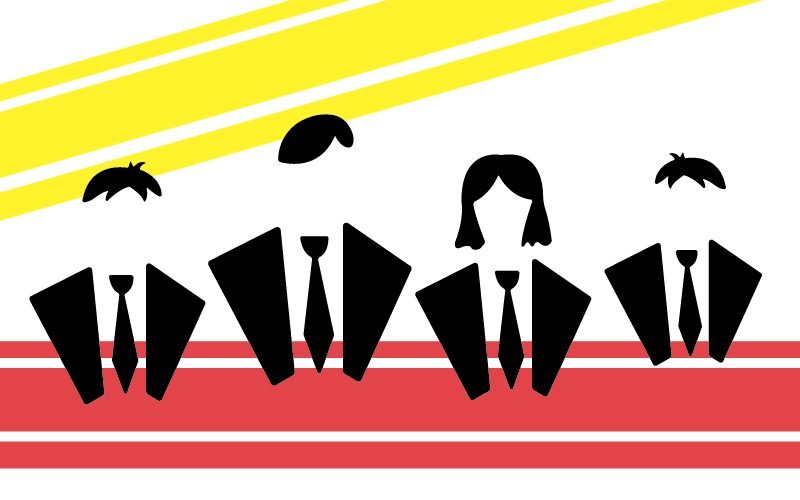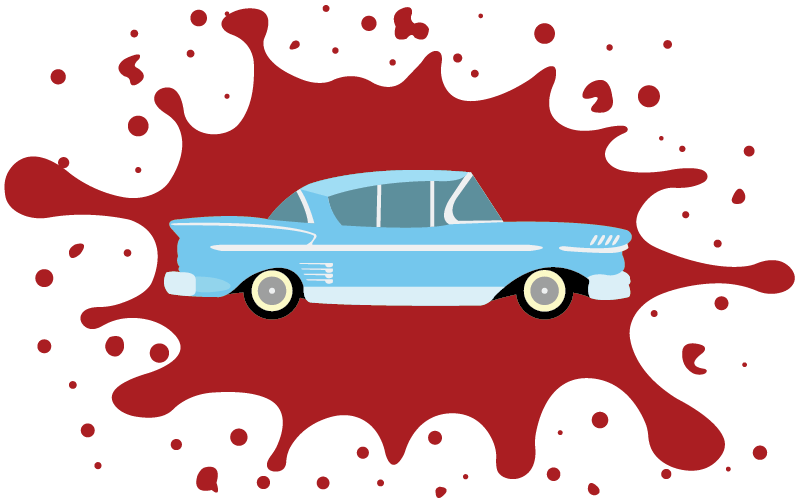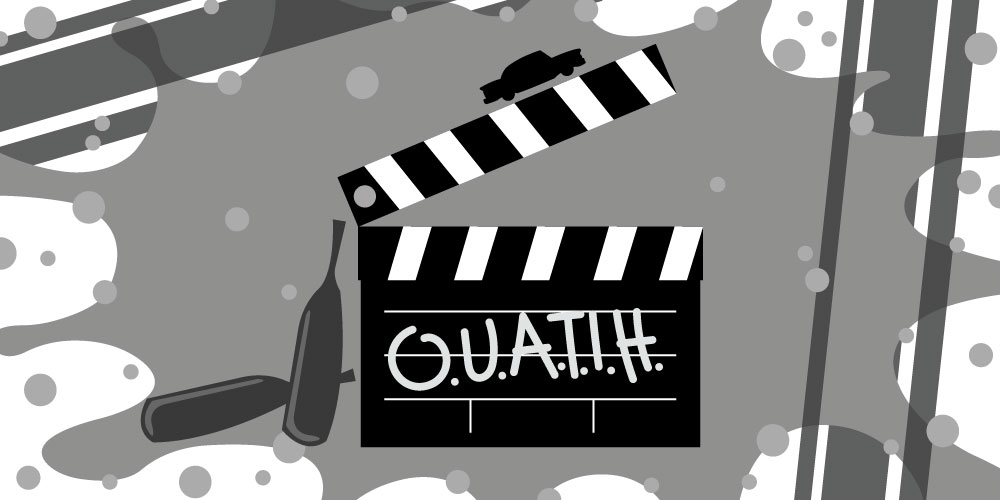Given the discouraging fact that movies aren’t nearly as culturally important as they used to be, Quentin Tarantino is probably on the shortlist of auteurs who can still put asses in theater seats. Maybe Paul Thomas Anderson and the Coen brothers are among the very small number of contemporary filmmakers whose films everybody has to go see even if they’re not movie people. Susan Sontag used to say that being a cinephile in the ’60s meant that there was “a new masterpiece every two weeks.” Given how many movie theaters are closing and how almost all access to films comes from streaming platforms, with the built-in preference for TV shows and the joys of binging, going to a proudly cinematic Tarantino flick is almost like taking part in that long-passed era.
I can still remember seeing Reservoir Dogs the summer after my freshman year of high school on a grainy videotape (remember those?) the night before I left for a missionary trip to spend a summer in Iceland. Much to the consternation of the rest of the team, I just couldn’t shut up that summer about what I’d seen, in between cutting steel rebar in an idyllic field and daydreaming through group Bible study. That creepy ear cutting, those cool black suits, the color-based nicknames (“Mr. Brown, isn’t that suspiciously close to Mr. Shit?”) and how it was all told in a series of alternating flashbacks. I wore out the videotape I had of it and I can’t imagine how many times my friends and I played the soundtrack.
And then Pulp Fiction was a mindfuck on a whole different, much higher level. Not only did it bring idiosyncratic indie cinema mainstream with Oscar wins and huge box office, but the endlessly entertaining script entered the lexicon. That’s how you know something will last. Quoting a speech about foot massages and made-up Bible verses, Royales with cheese, and where Christopher Walken had to surreptitiously stash a gold watch became an easy way of either letting someone else know you were alright, that you could hang, or having someone try to break the ice with you. Tarantino enjoyed a certain reputation for ultra-violence that eventually made him a household name, a clever way of branding himself so that people could talk about him at parties and sound like instant experts.

After I got a bit older and started seeing some of the films that inspired Tarantino in the first place, he lost some luster. Sure, I enjoyed the Kill Bill flicks and Jackie Brown just fine, but the films of somebody like, say, Jean-Pierre Melville with their elegant heroes in clad in crisp chapeaus and ineffable Zen fatalism left Tarantino’s blathering badasses way behind. Sometimes Tarantino improves on his source material, other times it’s way more fun to just go directly to the originals. Personally, I’m not a stickler for absolute historical accuracy in fiction as long as it’s clear that accuracy isn’t what the artist is after. We’ve got actual history books for facts and context. Watching Tarantino movies for their references and allusions alone can be a lot of fun and adds visual and verbal pizazz but sometimes when he tries to tell a story about a heavy-duty historical subject like fascism or slavery, there might be less going on than meets the eye.
Judging movies is notoriously subjective since they stir up our unconscious associations and desires like no other art form. But if you ask me, after the strong but flawed Inglourious Basterds Tarantino’s been in a pretty big slump. Basterds had plenty of thrills and chills but some critics have pointed out that it wobbled in its wacky portrayal of Hitler, who comes off as a cape-clad flibbertigibbet who seems more ludicrous than sinister. Charlie Chaplin’s The Great Dictator and Mel Brooks’ History of the World, Part I both winningly satirized Hitler by making him overtly ridiculous, such as spouting gibberish and ice skating, but those movies were explicitly intended to be comedies (albeit with a side of serious intent) so the hilarity came from them hitting the intended mark. Django Unchained felt at times like a genre exercise that bit off way more than it could chew; I’m still not sure what insights Tarantino had to offer about the innumerable abominations of slavery. Leonardo DiCaprio’s man-child plantation owner, equally obsessed with candy and phrenology, was way too over-the-top to be truly scary or shocking, which are two things that any slave master really ought to be. Personally, I found The Hateful Eight to be disappointingly lazy, poorly plotted, and ultimately pointless. When the narrator has to literally back up the story in the middle to inform the audience about a missing plot point in order to keep it coherent, then maybe there’s something very flawed with the story itself. After having passionately defended Tarantino for years, I was starting to warm up to the notion that the man sure knew his movies, but what did he really have to say? Or for that matter, I wondered what he understood about pretty complex and important topics other than what he’d absorbed from all those long hours spent in front of the screen.
This is why I was very glad to see that his new film Once Upon A Time . . . in Hollywood works far better than his previous films. This time around there are no manic cartoons made out of monumental subjects like German fascism or American slavery. Instead, he focuses his gaze where it really belongs — on Hollywood, with the hidden corners of Los Angeles as Tinseltown’s real-life backdrop. Telling the story of Hollywood’s transition from the rock ’em sock ’em world of cowboys and Indians into the edgier, arguably wilder world of underground hippie culture on the rise is a story that Tarantino is well suited to tell. And tell it he does, with all rhetorical guns blazing we are immersed in the story of the soon-to-be washed-up veteran actor Rick Dalton, played with an alternating lunkheaded charm and seething self-loathing by Leonardo DiCaprio, and his steadfast but somewhat exploited stunt double Cliff Booth, with Brad Pitt at his most charismatically laid back.
Dalton has definitely gotten used to seeing his name in lights over the years, but he’s starting to realize that he’s losing a step. His talent, such as it is, lends itself best to the kind of macho ass-kicking that works in small doses on TV or in cheesy Westerns but he doesn’t have the range or depth to handle parts that require more than just grit and squinting. Rick doesn’t really know how long he’s got to go in Hollywood but he’s also not about to give up on the good life just because he tends to hit the sauce when he really should be learning his lines. He nearly breaks down completely at several points since he can’t help knowing that his time is nearly up as a movie star.

For his part, Cliff seems to take all that self-pity and actorly self-obsession in stride partly because Rick’s his meal ticket and partly because he kind of likes being Rick’s only friend. Fixing Rick’s TV antenna and driving him around gets him some occasional stuntman work (including a showdown with Bruce Lee) and beats working for a living. The cultural changes that will later be nostalgically called “The ’60s” are coming in hard and fast, with the long-haired stoner kids raking in the cash by riding their motorcycles like the free-spirited easy riders that they are and forcing Hollywood to adapt. The Rolling Stone’s “You’re Out of Time” plays during a particularly crucial part of the drama, letting the audience know what’s around the corner for old Rick and Cliff.
But of course this is a Tarantino film we’re talking about, so there’s a darker side to the story. Cliff ends up bumping heads with the Manson Family and Rick’s bachelor pad’s physical proximity to the infamous house of Sharon Tate and Roman Polanski does not bode well. In a certain sense, putting these two on a collision course with the Manson cult makes sense. Manson and his cronies were definitely on the outskirts of Hollywood. When the acid-crazed Manson crew mistakes Rick’s pad for the infamous house of New Hollywood golden children like Roman Polanski and Sharon Tate, all hell is liable to break loose.
This is where the film falters a bit. Using Charles Manson or his cult “Family” as a symbol or cultural touchstone is a little weak, for a variety of reasons. As much as Manson gets associated with the “death of the ’60s” or the “dark underbelly of hippiedom,” those clichés crumble instantly when one glances at his actual record. Manson was far from an evil mastermind and possessed no real talents rather than pretty basic manipulation and caused a great deal of pain and horror for absolutely no reason whatsoever. All he did was ruin quite a few people’s lives and unintentionally offer an easy scapegoat for those who wanted to demonize the hippies. Ideally, Manson ought to disappear completely from our cultural memory, which is precisely what he deserves.
In the car before raiding Rick’s house, some of the Manson crew debate whether or not to kill Dalton, since they’ve all seen him on TV and genuinely seem a bit star-struck. Eventually one of them decides to “kill the people who taught us to kill.” It’s an interesting bit of woozily circular reasoning, of course, and makes sense that it’s uttered by a drug-addled cult member. But I also couldn’t help but see it as a subtle way for the filmmaker to comment on his own blood-spattered reputation. The conventional wisdom on Tarantino is that all the zany violence in his films is intended to be a satire on the way media sensationalizes our lust for blood and guts.
Never mind what the tut-tutting moralists have to say about the influence of violent movies on society. I say it’s perfectly fine to enjoy some cinematic ultraviolence if that’s your thing; just make sure to keep the imaginary world and the real world clearly separated while you’re watching. It’s when the two intersect that we get into trouble, and by no means is this limited to art that happens to feature violent imagery or language — just look at a Trump rally. Thankfully, Manson only has a small cameo in the film, since his story definitely doesn’t need any more rehashing at this point. But Tarantino’s treatment of the Manson murders gets played for a certain kind of weird slapstick and underscores how much he misses the point.

It gets a little hard to defend Tarantino as a satirist when the very next scene goes all-in on the violence once again, including some prolonged bloody head bashing, plenty of gunshots, an attack dog, and is capped off with the spontaneous appearance of a blowtorch. Talented showman that he is, Tarantino knows perfectly well that the audience has been waiting for an epic climax to cap off a movie that’s been enjoyably cruising along for the past couple of hours. We’ve been trained to expect it from a million movies by now, including the kinds of Westerns that Rick Dalton makes. But it’s not stretching things too far to say that Tarantino gets off on the violence that he pretends to condemn. After all, he’s seen all those movies too.
The movie’s real insight about the devious side of Hollywood is much more subtle and seems to be a bit overlooked in much of the critical commentary. Tarantino very cleverly suggests the various ways in which Rick’s anxiety about his waning stardom causes him to obliviously use and abuse Cliff’s loyalty. As a veteran stuntman Cliff isn’t averse to getting knocked around a bit and it’s clear that he can handle himself. But as the story unfolds, we also see quite a few instances where Cliff is forced to either clean up Rick’s messes or has to make big sacrifices because of Rick’s self-indulgent extravagance and emotional meltdowns. He’s almost ordered to sit down and watch with him when Rick’s new episode on some goofy TV show airs. Bolstering Rick’s fragile ego is pretty much his entire job description. By the end, it’s highly possible that his ability to keep plying his trade is totally busted, and it’s an open question as to where he’ll end up. Meanwhile, Rick is totally gratified to get an invite at Tate and Polanski’s swinging pad while poor Cliff is off to god knows where.
It’s a slightly unsettling coda for a movie that has spent quite some time delighting in the sheer joy of filmmaking and takes us on a joyride through the world behind the scenes. The gory climax aside, it’s engagingly character-based and refreshingly free of Tarantino’s flip superficiality when approaching the big subjects. I think he’s a lot smarter and more insightful when he isn’t intending to be. It also serves as a sharp reminder of what happens to all the little people out there in Hollywoodland, the unacknowledged many who end up doing all the grunt work to help keep all those fabulous dreams coming to theaters near you. •




